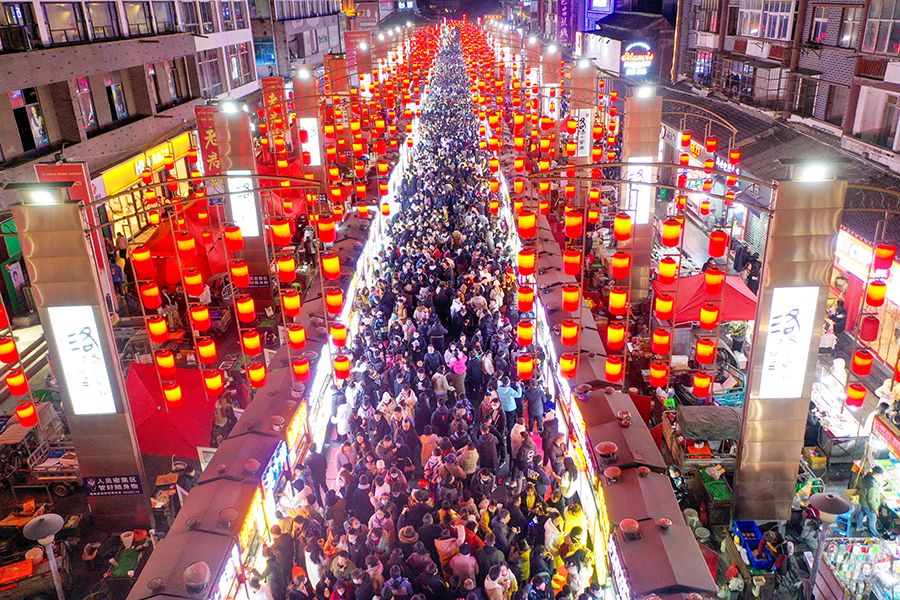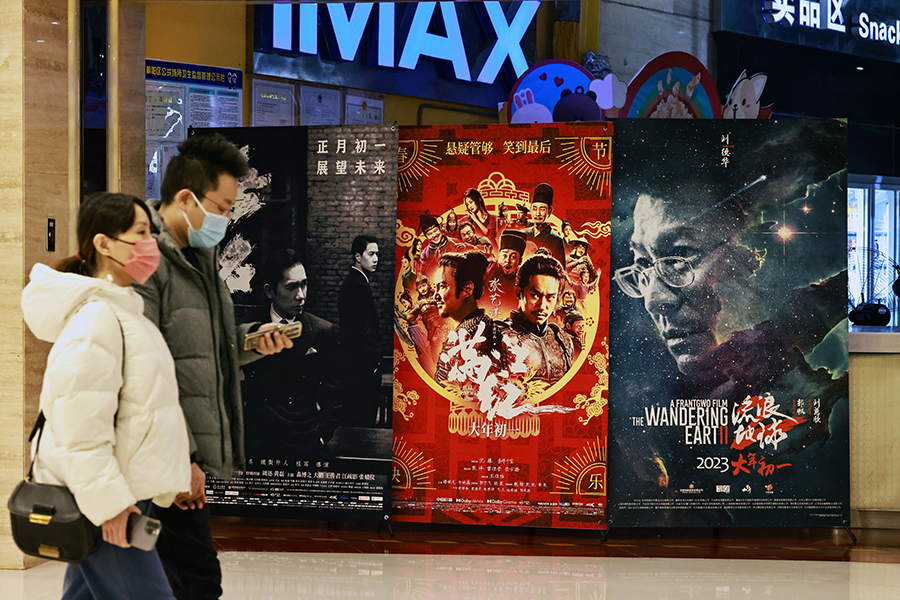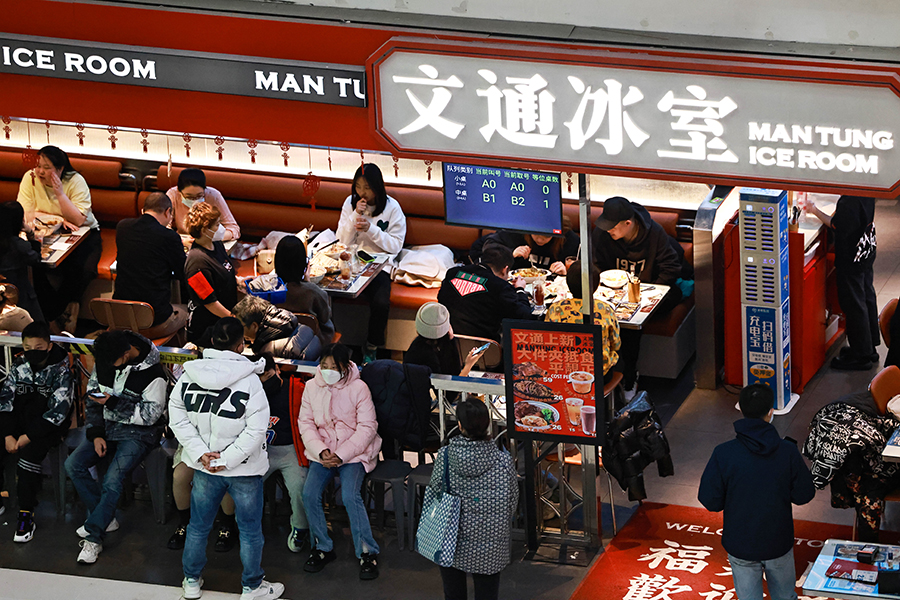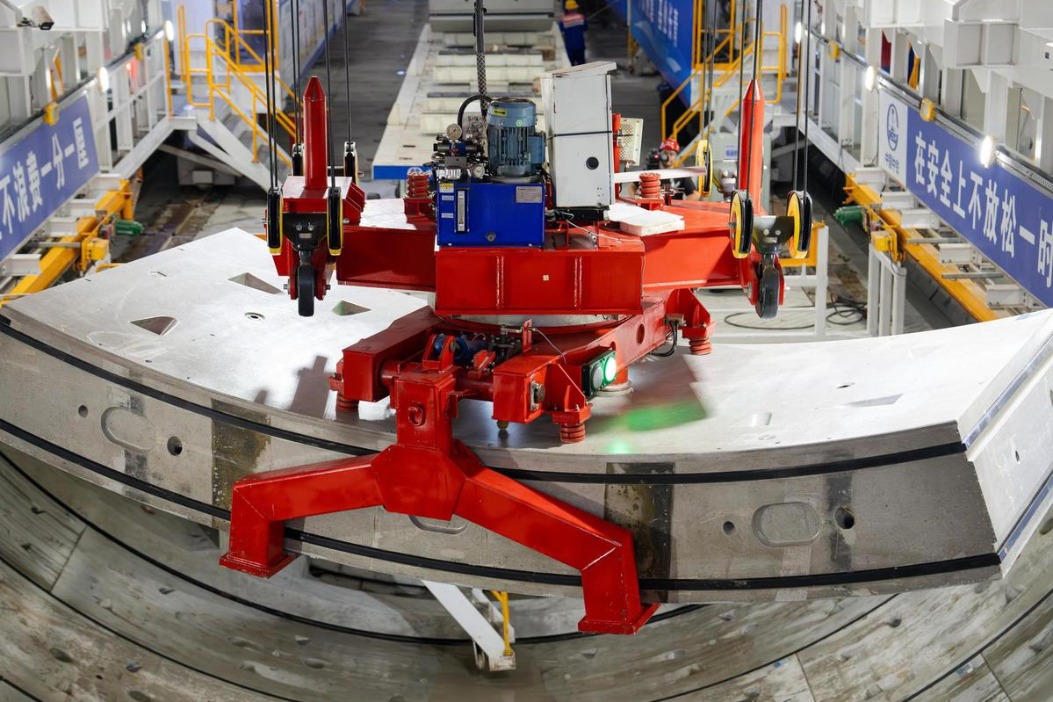Consumption upgrade promises growth momentum


Holiday in late Jan heralds spending spree, demand surge as green, smart goods rise
The hustle and bustle of marketplaces have returned to China, especially during the Spring Festival holiday in late January, raising expectations that the optimization of COVID-19 response measures, combined with policies supportive of consumption, will help the consumer market to regain growth momentum this year, experts said.
China's consumption sector, including retail, catering, tourism and movie segments, were severely hit by the COVID-19 pandemic. All of them, however, have posted a strong recovery in the early part of this year when people swarmed shopping malls, restaurants, cinemas and tourist attractions during the weeklong Chinese New Year holiday, to satisfy their pent-up consumption desire.
The robust recovery in consumer spending during the holiday showcased the enormous vitality and strong resilience of China's economy, the world's second-largest, and will give a strong boost to the country's economic rebound, industry analysts said.
They emphasized that boosting consumption is a crucial step for expanding domestic demand, and the recovery of consumption, more than investment, is seen as critical to China's economic rebound this year.
In the context of the Spring Festival holiday, sales revenue of China's consumption-related sectors rose 12.2 percent this year over the corresponding period of last year, data from the State Taxation Administration showed. The figure saw an average annual growth of 12.4 percent compared with the pre-pandemic Spring Festival holiday in 2019.
Retail and catering enterprises reported a 6.8 percent year-on-year growth in their revenues during the Jan 21-27 holiday, according to the Ministry of Commerce.
Sales of cereal, oil and foodstuffs grew by 9 percent, clothing by 6 percent, gold and jewelry by 4.4 percent and automobiles by 3.6 percent at retail enterprises monitored by the ministry.
The consumption of catering, hospitality and other life style services also saw a strong rebound during the holiday, while consumers' spending on dine-in services at restaurants and eateries surged 15.4 percent compared with the same period of last year.
The popularity of online shopping increased among Chinese consumers. E-commerce platform JD's on-demand retail service Shop Now reported that between Jan 21 and 27, its overall sales increased by 90 percent over the Spring Festival holiday last year.

Gift boxes, fruits, alcoholic beverages and mobile phones were the most popular goods bought during the weeklong holiday.
Sales of smart health monitoring products on JD Shop Now increased more than tenfold year-on-year, while the turnover of massage devices, electric kettles and air purifiers doubled during this period. The transaction volume of kitchen appliances like floor-cleaning robots, cooking machines and air fryers increased by more than eight times compared with the previous year.
While global economic growth is projected to decelerate from an estimated 3 percent in 2022 to 1.9 percent this year, China's growth is expected to improve moderately this year, according to a United Nations report.
With the Chinese authorities adjusting COVID-19 containment policies in late 2022 and easing monetary and fiscal policies, China's economic growth is forecast to accelerate to 4.8 percent in 2023, said the UN report.
China's GDP expanded 3 percent year-on-year in 2022 to 121.02 trillion yuan ($17.59 trillion), according to the National Bureau of Statistics. Consumption contributed to 32.8 percent of China's economic growth last year, driving GDP growth by 1.0 percentage point.
"Consumption plays a fundamental role in China's economic development and is the main driving force boosting economic growth," said Wang Yun, a researcher at the Academy of Macroeconomic Research, which is affiliated with the National Development and Reform Commission, the country's top economic regulator.
Wang said she is optimistic that consumption momentum will be maintained this year, with the growth rate expected to exceed 6 percent. "We have observed that Chinese shoppers have attached great importance to safety and health, and prefer to buy high-quality products. Health-related commodities like nutritional products, medicine and fitness equipment have been increasingly favored by consumers."
Wu Chaoming, deputy director of the Chasing International Economic Institute, said the continued optimization of COVID-19 containment policies will significantly bolster consumption growth and stimulate residents' appetite to travel and spend this year.
Per capita consumption expenditure among Chinese residents is expected to grow between 8 percent and 12 percent this year compared with 2022, while retail sales of consumer goods, a vital consumption indicator, will increase between 7 percent and 11 percent, Wu estimated.
"We expect China's economic growth in 2023 to be much higher than that of the previous year, mainly driven by consumption," said Robin Xing, chief China economist with Morgan Stanley, while expressing optimism that service-related consumption will grow this year.

The domestic tourism market also witnessed a robust recovery during the holiday with 308 million visits, up 23 percent year-on-year, recovering to about 88.6 percent of the 2019 level, generating a revenue of 375.8 billion yuan, up 30 percent year-on-year and recovering to 73 percent of the 2019 level, according to the Ministry of Culture and Tourism.
Data from online travel service provider Trip.com Group showed outbound travel orders surged 640 percent year-on-year during the holiday, while Chinese mainland tourists' bookings for overseas hotels and international flight tickets both soared more than four times over the same period of last year.
Justin Koh, senior vice-president at global consulting company AlixPartners, said: "We anticipated the resumption of travel, starting with the Chinese New Year holiday. The number of international flights will rise in the second quarter of this year, which is expected to help boost leisure and business travel both at home and abroad."
Cinemas across China welcomed moviegoers with a bunch of highly anticipated blockbusters during this year's Spring Festival holiday. Some 129 million tickets were sold, generating a whopping 6.76 billion yuan in box-office receipts, up nearly 12 percent from the comparable period of 2022, according to the China Film Administration. The earnings made this year's holiday the second-highest grossing to date.
Bai Ming, deputy director of international market research at the Chinese Academy of International Trade and Economic Cooperation in Beijing, said: "China's consumer market has seen recovery of growth during the holiday, which indicates the vitality of domestic consumption and the restoration of consumer confidence, and may bode well for China's economic performance this year, thanks to the optimization of COVID-19 control measures."
An article by Xi Jinping, general secretary of the Communist Party of China Central Committee, on major issues pertaining to the country's current economic work was published in this year's fourth issue of Qiushi Journal, a flagship magazine of the CPC Central Committee, on Feb 16.
It stresses efforts to expand domestic demand by prioritizing the recovery and expansion of consumption, and effectively driving investment of the whole society through government investment and policy incentives.
Consumption rebound is a key theme this year. The tone-setting Central Economic Work Conference in mid-December said that China will focus on boosting domestic demand by prioritizing the recovery and expansion of consumption in 2023. The report to the 20th National Congress of the Communist Party of China in October stressed the need to expand domestic demand and better leverage the fundamental role of consumption in stimulating economic growth.
In addition, the State Council (China's Cabinet) executive meeting in late January urged measures to accelerate the recovery of consumption as the main economic driving force, and called for policies supporting consumer service businesses and self-employed individuals and promoting the consumption of cars and other big-ticket items to be fully implemented.
Local governments across the country have accelerated steps to roll out favorable policies to boost consumption like distributing shopping vouchers. Shanghai unveiled an action plan including purchase tax exemptions for new energy vehicles and vouchers for sectors like cultural tourism and catering.
The authorities in Shenyang, capital of Liaoning province, launched a 100 million yuan voucher campaign from Jan 10 to Feb 28 to boost sales of automobiles and home appliances.
The government in Tianjin distributed shopping coupons worth 115 million yuan, while Beijing's Fangshan district issued 1 million consumption vouchers to encourage spending in the cultural and tourism sector from Jan 11 to Feb 2.
Chinese shoppers unleashed their pent-up purchasing demand during the Spring Festival holiday, and their consumption level almost returned to the pre-pandemic level, said Pan Helin, co-director of the Digital Economy and Financial Innovation Research Center at Zhejiang University's International Business School.
China's consumption growth is estimated to reach about 6.7 percent this year, said Wang Tao, head of Asia economics at UBS Investment Bank, who predicted this year's GDP growth will be about 5 percent and the growth of full-year nominal retail sales will reach about 9 percent.
"China boasts a sizable consumption market, with immense development potential and resilience. The key to stabilizing economic growth is maintaining stable consumption growth," said Zhao Ping, deputy head of the Academy of China Council for the Promotion of International Trade, which is based in Beijing.
She also urged more efforts to encourage enterprises to use new-generation information technologies, such as big data, cloud computing and artificial intelligence to create new types of green and intelligent consumer goods and cultivate new consumption growth points.




































